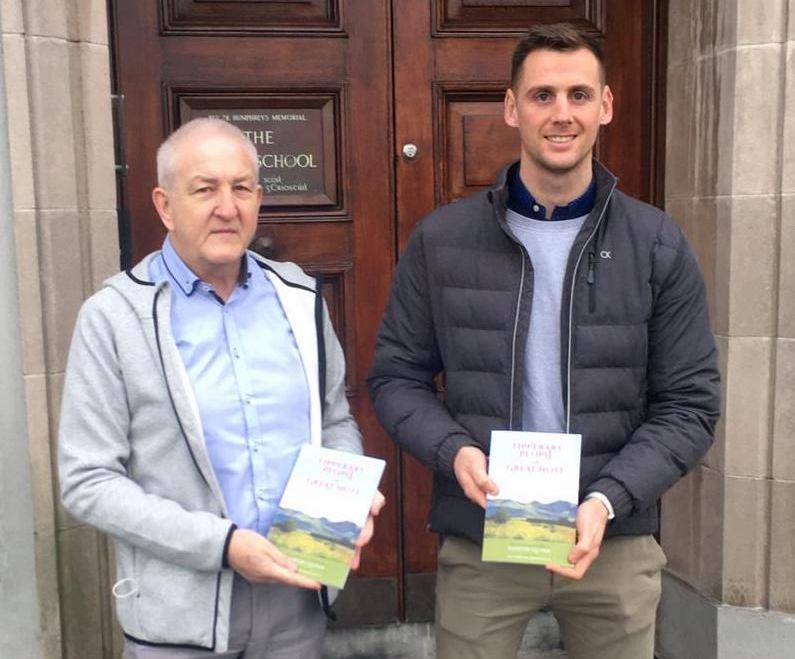Having suffered a stroke in 2013, Martin Quinn made the decision to overcome the impact on his cognitive function and compile his first book, "Tipperary People of Great Note".
As we tentatively step out of lockdown it is appropriate to consider how we best used the great amount of free time that the pandemic and subsequent restrictions allowed for. In my case, I took up something that I had always enjoyed doing, and that was writing.
I suppose you could say that writing was in my DNA and whether it was taking minutes, compiling various types of reports, writing citations or indeed newspaper notes, it was something that I generally enjoyed and was considered to be good at. There are however many turns and twists along the road of life and often we have no control over where life will take us.
In 2013, I suffered a stroke which had a profound impact on my speech and my cognitive function. I can clearly recall the absolute terror of that moment, of trying to speak while doing an interview on local radio, and of no words coming out of my mouth. It is something that I am reminded of every time I do a radio interview.
Read more
Apart from my speech my cognitive function was badly affected and considering my background in writing I found this to be extremely challenging. In the months and years after the stroke, I challenged myself time and time again to regain my ability to write with the same fluency as I had before.
The pandemic gave me a unique opportunity to work on my writing and I did this by writing some articles for my local newspaper 'The Nationalist' before coming up with the idea of writing a book. I knew that this would involve a lot of research and would challenge me greatly in relation to my cognitive ability but it was something that I felt was within my grasp and would be a great achievement.

Martin Quinn with Tipperary Senior Football Captain, Conor Sweeney, at the launch of his book, 'Tipperary People of Great Note'
"Tipperary People of Great Note"
Being a lover of local history I came on the idea of recognizing Tipperary people from history who were noteworthy for various different reasons. What amazed me in my research was the number of people who had emigrated from the area and who had left their mark in countries across the world. I found that the more I looked the more I discovered and I eventually stopped at 86.
The research and compilation on each person was quite a challenge and there were days when I would start my writing and would have to discontinue as my brain would shut down or I would experience 'brain fog' or I would be completely fatigued.
Anyone that has suffered a stroke will know exactly what I mean by this and will know how challenging it is for stroke survivors. It was important for me not to overtask the brain and to allow time for rest and recuperation after long periods of research.
Suffering a stroke changed my life completely and presented me with many challenges to overcome but the challenge of having a book published was nevertheless something that I relished undertaking. Most people will not recognize or understand the level of the challenge of cognitive impairment because it is not something visual to people, but dealing with impaired cognitive function following a stroke is tremendously difficult.

Maisie O'Brien, grand niece of Martin Quinn reviews his book 'Tipperary People of Great Note'
Therefore to have a book published was for me a major achievement and to have it feature Tipperary people of great note was something to really appreciate. Lockdown presented me with an opportunity to recognize these Tipperary men and women, which included many pioneers who were previously relatively unknown, and to provide a catalog that would be there for generations to come.
The name Tipperary is celebrated in song and story and my collection provides the opportunity to learn about some of the people and of their contribution to their community, to national life, and to humanity generally.
I was very fortunate to have the support of Tipperary people in ensuring that my work would be published. Gerard O'Connor and the staff of Blackhall Publishing showed great confidence in my research and writing ability and historian and former Minister Dr. Martin Mansergh, gave important credence to the book by providing a foreword and for facilitating a painting by his late mother of "The Galtees and Glen of Aherlow" for the cover of the book.
Many people have used lockdown to do very different things. In my case, it was to compile a book titled "Tipperary People of Great Note" and to have it published, but it was also to keep my brain active and in doing so to stay mentally well. Your brain is similar to a muscle, you need to use it or you lose it so it was crucially important for me to keep my brain in shape.
I hope that all stroke survivors will take confidence from my achievement and will know that there is still so much that can be accomplished in life after a stroke.
* Martin Quinn is a stroke survivor and a member of the Irish National Audit of Stroke Governance Committee. He is author of the book 'Tipperary People of Great Note'. Find out more about the book at OrpenPress.com.

Looking for Irish book recommendations or to meet with others who share your love for Irish literature? Join IrishCentral’s Book Club on Facebook and enjoy our book-loving community.
This article was submitted to the IrishCentral contributors network by a member of the global Irish community. To become an IrishCentral contributor click here.




Comments